The Drain, Waste and Vent (DWV) piping system in a building is a crucial component of the overall plumbing infrastructure. In a building, the Drain, Waste and Vent (DWV) system is an often overlooked, yet it is an essential component of the plumbing infrastructure. The majority of DWV piping systems are hidden below floors, behind Read more
AB&I Foundry

The Drain, Waste and Vent (DWV) piping system in a building is a crucial component of the overall plumbing infrastructure.
In a building, the Drain, Waste and Vent (DWV) system is an often overlooked, yet it is an essential component of the plumbing infrastructure. The majority of DWV piping systems are hidden below floors, behind walls, and in ceilings. Out of sight, out of mind. That is until your previously fully functional plumbing system has a problem.
Plumbing may be out of sight, but just like any other mechanical system, your DWV piping should be properly and regularly maintained, regardless of the material. Developing a DWV maintenance plan will keep your plumbing system top of mind. This will help facility management to budget effectively for your system maintenance and diminish the likelihood of plumbing emergencies that could send your building occupants reeling.
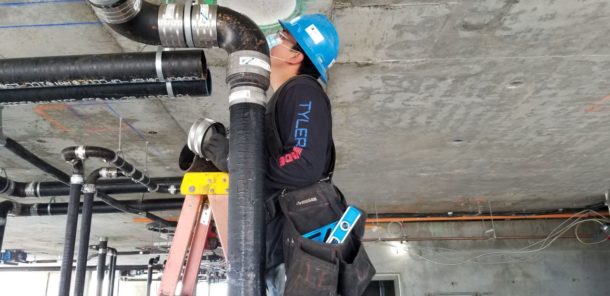
DWV System Evaluation
There is no one-size-fits-all maintenance program for DWV systems. Building occupancy type and usage, piping material, and other special conditions that are unique to your building requires evaluating your DWV systems as a first step.
Facility management can start by performing a regularly scheduled visual examination of the DWV system. You are looking for proper slope, appropriate support of the piping system and components, suitable venting and clear vents, and of course, any visible leaks in the piping system, among other things. Regular visual inspection is just one step in a larger effort to maintain your DWV system.
If your visual inspection reveals no obvious signs of wear and tear, do not assume that you are in the clear. Many factors outside of the DWV system can have negative effects on it and its long-term functionality. These factors are what are at the heart of the maintenance program. As conditions change, the frequency and the way you maintain your system should change with it.
Once you have completed your visual inspection, consider the risk factors that make your building unique. What are some of the considerations when determining the factors and frequency of your maintenance program?
- Cleaning chemicals Harsh cleaning chemicals having a pH range outside the normal range of expected sanitary effluents could be harmful to the DWV system, unless properly flushed.
- Grease Interceptors These should be serviced in accordance with manufacturer’s recommendations so as not to allow its contents to go septic. Proper disposal of food particles is key to the health of an interceptor.
- Gases from the municipal sewer Some municipalities depend on the building’s vent system to vent gases from the sewer, which can be harmful to the building vent piping because this is not the intended application. When these gases are in the system, regular flushing should be performed to minimize the impacts.
- Building usage Is the buildings occupancy year-round or seasonal? If usage is low, more frequent maintenance of the DWV system may be required.
- Low flow or no flow fixtures The proliferation of low flow and waterless fixtures for conservation have unintended consequences. Not enough water in the lines to self-scour or to float the proverbial boat leaves behind microbes that are potentially harmful to your piping system.
- Soda fountains Sodas are typically low pH fluids. In high concentrations, they can be detrimental to pipe and fittings, especially if they are not properly flushed through the system.
- Commercial kitchens High temperature fluids from pasta stations or commercial dishwashers can exceed the working temperatures of certain piping systems and lead to system failures.
- Special waste Any waste outside the scope of normal sanitary effluents should be treated as such, with piping approved for the materials that they are conveying. Any special chemicals must be properly diluted before being allowed in the city sewer.
- De-icing Agents De-Icing agents (road salts, sand and the like) used on roadways can accumulate in the DWV system in parking garages. This accumulation needs to be assessed and a maintenance schedule developed to flush and clean the system to the municipal sewer.
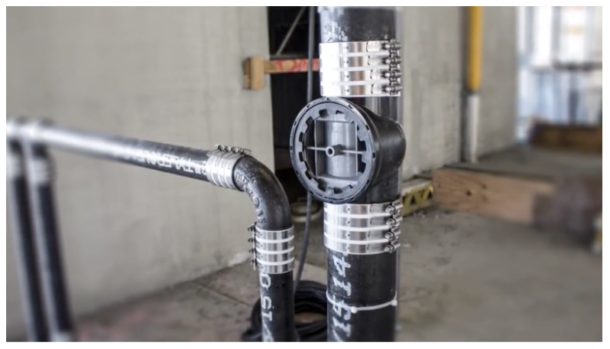
How To Maintain Your DWV System
There are countless tools available for you to incorporate into a facility maintenance program. Here are just a few:
- Camera inspection allows you to see inside your piping system and identify issues that would otherwise remain hidden until it is too late.
- Jetting, drain cleaning, cabling, or rodding to the municipal sewer are also effective methods for cleaning and clearing your DWV system.
- Solenoid may be installed to introduce water to dilute, wash or clean the DWV system where needed.
- Installing vented running traps to isolate the building’s DWV system from the city sewer will prevent your municipality from relying on your building to vent gases into the city sewer system.
- Follow the manufacturer maintenance recommendations of any dilution tanks the building may have.
- Identify and replace any aggressive cleaners that the building cleaning or maintenance personnel may be using with a neutral pH cleaning alternative.
- Consider installing upstream flush valves on soda fountain lines for proper dilution.
Many factors outside of the DWV system itself can have long-term effects on the system’s performance and functionality. Slope, system design, fixtures, frequency of use, chemicals and cleaners, maintenance, materials, and water levels and quality are just some of the factors that can affect a DWV system. All of these influences and more need to be examined and properly assessed by facility management when creating an effective plastic or cast iron DWV system maintenance program.
The information above is not meant to be a complete list of all factors that need to be considered and are merely suggestions for formulating a maintenance program. Proper flushing of your DWV system on a regular time schedule is crucial to a long service life. It may be necessary to consult a plumbing professional when designing an effective DWV preventative maintenance program to keep your plumbing system from being top-of-mind for all the wrong reasons.

The Cast Iron Soil Pipe Institute (CISPI) is pleased to announce the launch of its new brand identity. The new logo and supporting brand assets were updated to introduce a new generation of plumbing engineers, designers, code officials, contractors and installers to the Institute. Designed by Agency McKenna in Chicago, IL, the new brand identity Read more
The Cast Iron Soil Pipe Institute (CISPI) is pleased to announce the launch of its new brand identity. The new logo and supporting brand assets were updated to introduce a new generation of plumbing engineers, designers, code officials, contractors and installers to the Institute.
Designed by Agency McKenna in Chicago, IL, the new brand identity fits into the Institute’s larger marketing communications strategy to build broad-scale awareness within the building and construction industry. Because the Institute communicates with a variety of audiences, it was especially important to create branding that was easily recognizable. The specification and implementation of cast iron soil pipe products involves a myriad of groups in the supply chain, including building owners, contractors and commercial plumbing professionals.
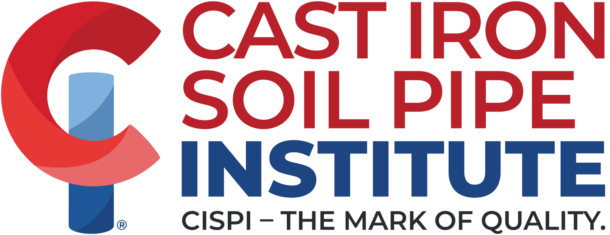
The new identity incorporates a bright red and blue color scheme that reinforces the Institute’s “Made in America” heritage and represents the CISPI member companies that manufacture cast iron soil pipe products domestically. The energetic use of color and multidimensional curves brings vibrancy to the “C I” trademark. The updated tagline, “CISPI – The Mark of Quality” emphasizes the product’s high-quality manufacture found only in American-made products. The new branding has a distinctly modern feel with continuity to the Institute’s past logo designs.
Dave Parney, CISPI Executive Vice President, was especially pleased with the new look. “I am very proud to announce the launch of our new brand. I believe our new branding is distinctive enough to appeal to younger audiences, but will still resonate with the seasoned industry professionals who have known the CISPI brand for years.”
CISPI Board of Director, Francesca Dunbar, continues, “Our new branding supports the Institute’s current priorities and highlights the quality that the Institute has maintained for years. It will be an important asset for us as we look to expand our reach to new audiences across the country.”

Biennially, ASPE presents the prestigious Industry Award to companies that have provided outstanding service to the advancement of plumbing engineering technology. This year, ASPE is pleased to present Industry Awards to McWane Inc. and QuantumFlo. “The support that both companies have given in time, education, and resources to this Society in recent years has been exceptional,” Read more
Biennially, ASPE presents the prestigious Industry Award to companies that have provided outstanding service to the advancement of plumbing engineering technology. This year, ASPE is pleased to present Industry Awards to McWane Inc. and QuantumFlo.
“The support that both companies have given in time, education, and resources to this Society in recent years has been exceptional,” says Thomas P. Sharp, ASPE’s Vice President, Affiliate. “Although it is always tough for ASPE to narrow down the award selection process to only two companies, both are very deserving of this honor in every criteria.”
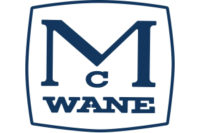 The McWane Plumbing Group is part of the McWane, Inc. group of companies. The Plumbing Group manufactures cast iron soil pipe and fittings, no-hub couplings, and drains. Headquartered in Birmingham, Alabama, McWane is a global manufacturer of ductile iron products and is one of the world’s most important suppliers of waterworks and monitoring products.
The McWane Plumbing Group is part of the McWane, Inc. group of companies. The Plumbing Group manufactures cast iron soil pipe and fittings, no-hub couplings, and drains. Headquartered in Birmingham, Alabama, McWane is a global manufacturer of ductile iron products and is one of the world’s most important suppliers of waterworks and monitoring products.
“We are honored to receive the Industry Award from ASPE, and we look forward to future opportunities where we can serve the engineering community,” says Francesca Dunbar, Vice President of Marketing for the McWane Plumbing Group. “We are always looking for opportunities where we can support ASPE’s efforts, from sponsorships to the development of continuing education content.”
 Founded in 2007, QuantumFlo is a world leader in pumping and pump control system technologies and an innovator of sizing and selection applications and rules for variable-speed pumping. The company’s packaged plumbing booster systems are custom-built to customer specifications and include integrated control technology to ensure efficiency.
Founded in 2007, QuantumFlo is a world leader in pumping and pump control system technologies and an innovator of sizing and selection applications and rules for variable-speed pumping. The company’s packaged plumbing booster systems are custom-built to customer specifications and include integrated control technology to ensure efficiency.
“QuantumFlo is delighted and honored to be selected as a 2020 recipient of the ASPE Industry Award,” says David Carrier, Founder & CEO of QuantumFlo. “On behalf of our QuantumFlo representatives, specifiers, and employees, we would like to thank ASPE for this special recognition and ongoing support of our efforts to propel the plumbing industry through technology innovation. We are pleased to serve ASPE member engineers and work hand-in-hand with them to collectively address and solve challenges with highly intelligent solutions.”
Both McWane and QuantumFlo are ASPE Affiliate Sponsors and ASPE CEU Providers in addition to being long-time supporters of ASPE conferences and local ASPE Chapter events.
“I am very pleased and proud that two excellent Affiliate Sponsors of ASPE received the ASPE 2020 Industry Award,” Sharp continued. “McWane and QuantumFlo have both invested so much in the advancement of the plumbing engineering profession in addition to being excellent stewards of ASPE as valuable and engaged Affiliates. On behalf of all of ASPE’s valuable Affiliate partners, I extend warm congratulations and deepest thanks to both McWane and QuantumFlo.”
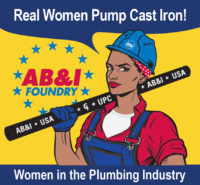
AB&I Foundry, in celebration of women in engineering, manufacturing and the skilled trades, has developed an iron woman character named “Rose.” The foundry has had a long history with their iron man character who is a big burly man. It was time for the company to feature a female character. The new Iron Woman pays Read more
AB&I Foundry, in celebration of women in engineering, manufacturing and the
skilled trades, has developed an iron woman character named “Rose.” The foundry has had a long history with their iron man character who is a big burly man. It was time for the company to feature a female character. The new Iron Woman pays tribute to the iconic Rosie the Riveter—the women civilians who built the warplanes during the WWII effort.
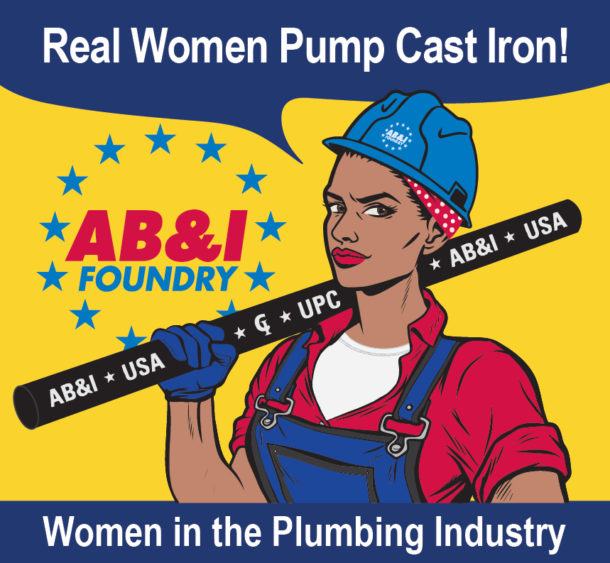
“There is a huge gap in our historical narrative about women in the trades and that is quickly changing as they are starting to fill the void in skilled trades as many baby boomers retire out of industry. While women are stepping into these rolls they are still underrepresented,” said Francesca Venezia Dunbar, Vice President of Group Marketing for McWane. “We hope that the new Iron Woman will pay tribute to the vast opportunities for women in industry.”
According to The Institute for Women’s Policy Research (IWPR), Between 2017 and 2018, the number of women working in construction trades increased by 17.6 percent, rising to well over a quarter of a million women (276,000), according to a recent analysis from IWPR. The American Society of Mechanical Engineers (ASME) shows that women make up about 47 percent of the overall workforce but are still underrepresented in science and engineering occupations. Only 14 percent of engineers are women. Despite these increases, women still only represent 10% of the construction workforce. According to the U.S. Department of Labor Statistics, jobs in the skilled trades are expected to grow by at least 11 percent by 2026, while three out of every four tradespeople are set to retire. This brings opportunity for women seeking employment in engineering, manufacturing and the skilled trades.
“The plumbing industry, as well as other industries, are chalked full of women breaking barriers with their actions. At AB&I we celebrate those individual women who are pushing through to achieve greatness, no matter the obstacles or tasks,” said Shannon Hooper, National Sales Manager of AB&I Foundry. “I feel that Rose is an embodiment of the changes happening in the construction industry and the world. I look forward to seeing Rose and other women meet the future head on and all the great things they will accomplish.”
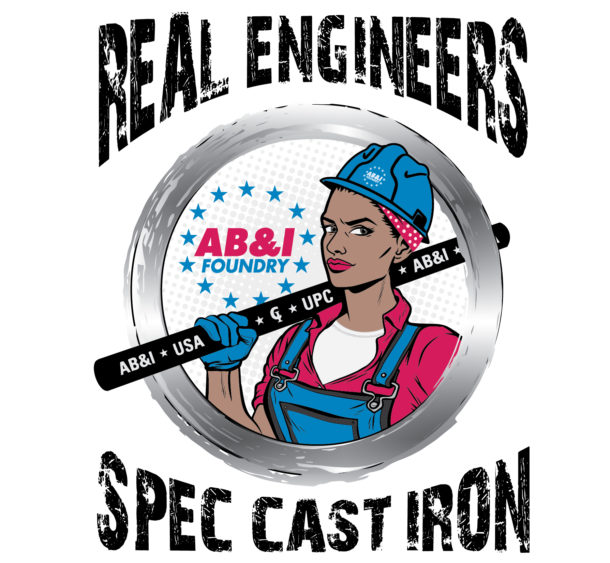
AB&I Foundry, an Oakland-based company that manufactures cast iron pipe and fittings for the plumbing industry, has a long legacy of manufacturing in East Oakland. The company has been manufacturing quality cast iron soil pipe that is used to convey fluids out of commercial and residential buildings since 1906. Plumbing infrastructure is critical to public health and sanitation and there are only three (3) manufacturers remaining in the United States. We remain OaklandSTRONG. Please follow us on www.ABIOakland, Facebook, Instagram and Twitter to keep current with AB&I events and information.
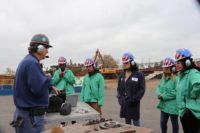
The Manufacturing Institute, the education and workforce partner of the National Association of Manufacturers, and AB&I Foundry, a leading producer of cast iron soil pipe and fittings used for commercial plumbing systems, celebrated Manufacturing Day on November 14th at the foundry in Oakland. The company hosted both middle-school and high school students. The students were Read more
The Manufacturing Institute, the education and workforce partner of the National Association of Manufacturers, and AB&I Foundry, a leading producer of cast iron soil pipe and fittings used for commercial plumbing systems, celebrated Manufacturing Day on November 14th at the foundry in Oakland. The company hosted both middle-school and high school students.
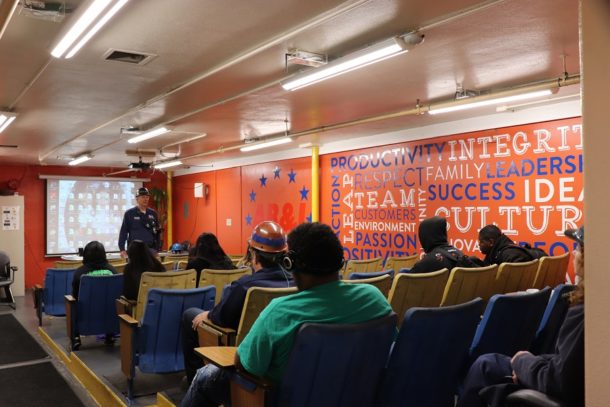
The students were taken on a tour of the foundry and shown several critical processes used to make cast iron soil pipe and fittings. They were also able to engage with manufacturing leadership and participate with hands-on projects including learning about how the manufacturing process functions, but also participate with the quality control function of measuring the actual metal castings. By demonstrating these aspects of manufacturing, the students were able to see how much science and precision is needed in a manufacturing.
“Manufacturers across the nation are seeing the best and brightest young talent entering manufacturing,” said Richard Watson, VP of Operations at AB&I Foundry. “These students are the future leaders and providing them the opportunity to explore opportunities with Manufacturing Day is important as they shape their future.
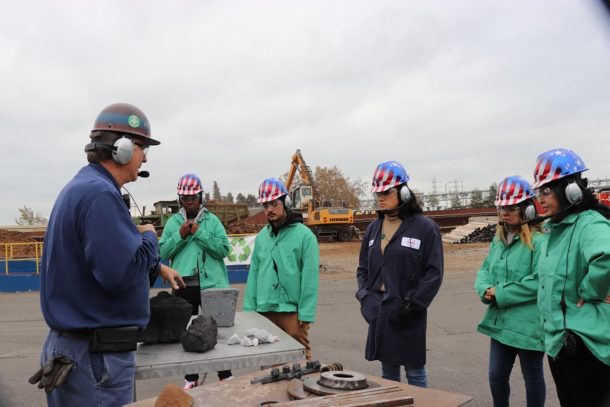
“Advanced Manufacturing is applied math and science and essential for our society and our infrastructure. We in the Oakland Unified School District value our partnership with AB&I Foundry who has opened their doors and hearts to our scholars. We need more partners like AB&I who are willing to provide valuable career awareness and exploration opportunities in the world of manufacturing”, Emiliano Sanchez, Coordinator of Career Technical Educational Trades and Apprenticeships.
MFG Day is led by The Manufacturing Institute. First held in 2012 and organized by its founder—the Fabricators & Manufacturers Association, International—MFG Day gives manufacturers the opportunity to address the skills gap, connect with future generations, update the public perception of manufacturing and ensure the ongoing prosperity of the industry as a whole.
